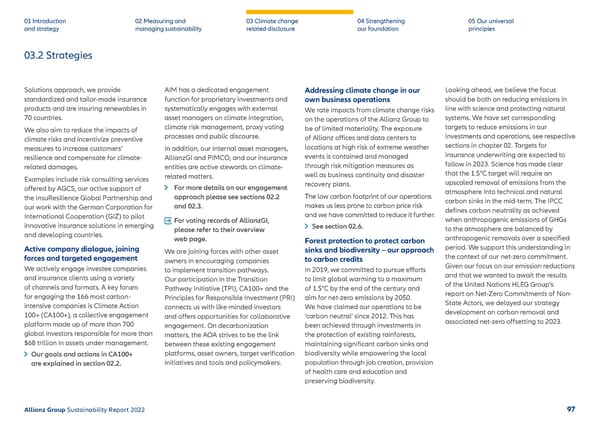Solutions approach, we provide standardized and tailor-made insurance products and are insuring renewables in 70 countries. 01 Introduction and strategy 02 Measuring and managing sustainability 03 Climate change r elated disclosure 04 Strengthening our f oundation 05 Our universal principles 03.2 Strategies We also aim to reduce the impacts of climate risks and incentivize preventive measures to increase customers’ resilience and compensate for climate- related damages. Examples include risk consulting services off ered by AGCS, our active support of the InsuResilience Global Partnership and our work with the German Corporation for International Cooperation (GIZ) to pilot innovative insurance solutions in emerging and developing countries. Active company dialogue, joining forces and targeted engagement We actively engage investee companies and insurance clients using a variety of channels and formats. A key forum for engaging the 166 most carbon- intensive companies is Climate Action 100+ (CA100+), a collective engagement platform made up of more than 700 global investors responsible for more than $68 trillion in assets under management. Our goals and actions in CA100+ are explained in section 02.2. AIM has a dedicated engagement function f or pr oprietary investments and systematically engages with external asset managers on climate integration, climate risk management, proxy voting processes and public discourse. In addition, our internal asset managers, A llianzGI and PIMC O, and our insurance entities are active stewards on climate- related matters. For more details on our engagement approach please see sections 02.2 and 02.3. For voting records of AllianzGI, please refer to their overview web page. We are joining forces with other asset o wners in encouraging companies to implement transition pathways. Our participation in the Transition Pathway Initiative (TPI), CA100+ and the Principles for Responsible Investment (PRI) connects us with like-minded investors and offers opportunities for collaborative engagement. On decarbonization matters, the AOA strives to be the link between these existing engagement platforms, asset owners, target verification initiatives and tools and policymakers. Addressing climate change in our own business operations We rate impacts from climate change risks on the operations of the Allianz Group to be of limited materiality. The exposure of Allianz offices and data centers to locations at high risk of extreme weather events is contained and managed through risk mitigation measures as well as business continuity and disaster recovery plans. The low carbon footprint of our operations mak es us less prone to carbon price risk and we have committed to reduce it further. See section 02.6. Forest protection to protect carbon sinks and biodiversity – our approach to carbon credits In 2019, we committed to pursue efforts to limit global warming to a maximum of 1.5°C by the end of the century and aim for net-zero emissions by 2050. We have claimed our operations to be ‘carbon neutral’ since 2012. This has been achieved through investments in the protection of existing rainforests, maintaining significant carbon sinks and biodiversity while empowering the local population through job creation, provision of health care and education and preserving biodiversity. Looking ahead, we believe the focus should b e b oth on reducing emissions in line with science and protecting natural systems. We have set corresponding targets to reduce emissions in our investments and operations, see respective sections in chapter 02. Targets for insur ance underwriting are expected to follow in 2023. Science has made clear that the 1.5°C target will require an upscaled removal of emissions from the atmosphere into technical and natural carbon sinks in the mid-term. The IPCC defines carbon neutrality as achieved when anthropogenic emissions of GHGs to the atmosphere are balanced by anthropogenic removals over a specified period. We support this understanding in the context of our net-zero commitment. Given our focus on our emission reductions and that we wanted to await the results of the United Nations HLEG Group’s report on Net-Zero Commitments of Non- State Actors, we delayed our strategy development on carbon removal and associated net-zero offsetting to 2023. Allianz Group Sustainability Report 2022 97
 Sustainability Report 2022 | Allianz Page 97 Page 99
Sustainability Report 2022 | Allianz Page 97 Page 99